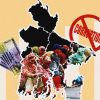It is time to reform the publishing sector

We have lost decades in our existential quest to build a knowledge-based society as a nation. Governments came and went, offering only lip-service and no unified vision or roadmap towards building a society where all everyday life decisions, whether personal or state-level, are based on some form of evidence-based knowledge. In other words, a society where expertise in any subject matter is valued, and where the creation and dissemination of local knowledge on a variety of subject matters is prioritised in the knowledge ecosystem.
The publishing industry is situated in the middle of making knowledge materials available to general readers, students, professionals, and public and private institutions alike. The publishing sector in any robust state plays a crucial role in reflecting the vibrancy of knowledge production and the creative output of a country. It mirrors the state of freedom of thought and expression that prevails in the country.
It will not be an exaggeration to say that for the entire lifetime of the country, this sector has suffered negligence in terms of its development, and access to being able to construct policies. This is despite the fact that to compete in the global economy these days, knowledge is the most important asset and should receive due attention in terms of how best it can be produced and delivered in the most professional and internationally accepted ways. Here is where the educational institutions and research organisations of the country also need to play a strong partnership role.
In the past regime, there was investment in books that only served a certain coterie, championing a certain narrative. Publications were part and parcel of the patronage system. Most government book acquisitions were primarily made to favour certain writers, bureaucrats and their family members who became best-selling writers overnight as their books were chosen for large government purchases. The merit of the books or the audience for whom the books were being purchased were hardly ever considered. There was no transparency in the process of project formulation, book selection and payments. We are aware of scams including the one about the Department of Primary Education's expenditure of Tk 150 crores in 2020 to purchase books for setting up Bangabandhu Corners in 65,700 schools. Out of this amount, over Tk 20 crores went to buying copies of only three books by someone named Najmul Hossain. The books were published by two entities owned by him. This is just one example among many such projects. An investigation ought to be conducted to investigate the extent of corruption and misappropriation of government funds in the name of projects for purchasing low quality, inappropriate books, or materials that only portray biased narratives about the country.
Under the current circumstances, despite the unprecedented challenges ahead, we are hopeful that this sector will receive renewed priority in forming a long-term unified and coordinated national vision. Therefore, I would like to place some recommendations that have emerged from my study of the existing literature on the sectoral development of the publishing industry and recent consultations with young and promising publishers who aspire for an environment conducive to nurturing their potential.
It is a matter of great privilege that a well-drafted National Book Policy is already in existence, and it only requires updating and review given the current context. The policy was first drafted and adopted by the cabinet in 1994. A revised and expanded policy was brought to the table for review and discussion in 2011.
An updated version based on a series of consultations with sectoral experts was drafted and submitted again to the cabinet. This attempt failed, and it has never seen the light of day. However, the draft is well prepared, forward-looking, with detailed plans for implementation. Moreover, most of its propositions are applicable even today. Just by reviewing the National Book Policy, it is possible to bring about some beneficial and necessary long-term reforms in the sector. In addition to what is covered in the policy the interim government could consider immediate, medium-term and long-term reforms along with a crisis mitigation agenda for this sector.
For the medium and long-term, one of the changes to consider would be placing the publishing sector under the purview of the Ministry of Commerce instead of the Ministry of Cultural Affairs. Strong interactivity with the education and cultural ministries could be maintained. The National Book Centre could be empowered as the apex body in charge of all matters relating to the knowledge sector; this can enable effective interministerial coordination. A detailed recommendation and implementation plan for transforming this institution into the National Book Development Council is provided in the draft National Book Policy.
In addition, we will require training facilities for enhancing the skills and building the capacities of aspiring publishing professionals. Grant programs may be created in all private and public universities for merit-based research and publications. We should create opportunities for international exposure to publishing practices elsewhere to improve our understanding and align our practices with international standards. Additionally, we should create opportunities for publishers to showcase their work at various international book fairs.
Furthermore, support should be provided for conducting reliable research and market analysis of the industry, enabling better decision-making at both the state and business levels. It is also important to support the creation of a strong sales and distribution network and to promote books throughout the country all year. Special provisions should be considered for promoting books through print, TV, and digital mediums.
Accompanying such reforms, existing copyright law should be reviewed and updated to better support the local publishing industry. Policies should be established to ensure fair and transparent purchasing by government and private institutions.
In the matter of immediate reforms and crisis mitigation efforts, we should turn our attention to the increased price of paper and other input material following Covid. With the current economic downturn already impeding recovery, we may want to consider offering publishers loans to revitalise the sector.
Additionally, two or more separate pressure groups and trade bodies representing publishers and booksellers should be formed within permissible legal framework. The existing trade body, ie the Bangladesh Pustok Prokashok O Bikreta Somiti (BAPUS) includes both booksellers and publishers. The result is a latent and existential defect, as it is a mix of two separate interest groups that are supposed to be on negotiating terms with one another
We hope that the current interim government will take the necessary steps towards rebuilding the foundation of the reformed state that will place excellence in knowledge production and dissemination at the centre of its state-reform agenda. The best way to attain this would be by reforming the publishing sector from the ground up. Rest assured, they can count on the youthful and patriotic energy of the well-intentioned and talented individuals in this trade to catalyse this essential and much-needed change.
Mahrukh Mohiuddin is the managing director of The University Press Limited (UPL).
Views expressed in this article are the author's own.
Follow The Daily Star Opinion on Facebook for the latest opinions, commentaries and analyses by experts and professionals. To contribute your article or letter to The Daily Star Opinion, see our guidelines for submission.

 For all latest news, follow The Daily Star's Google News channel.
For all latest news, follow The Daily Star's Google News channel. 










Comments